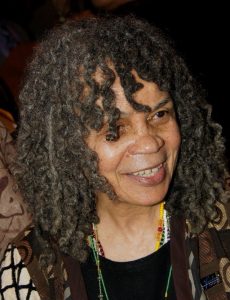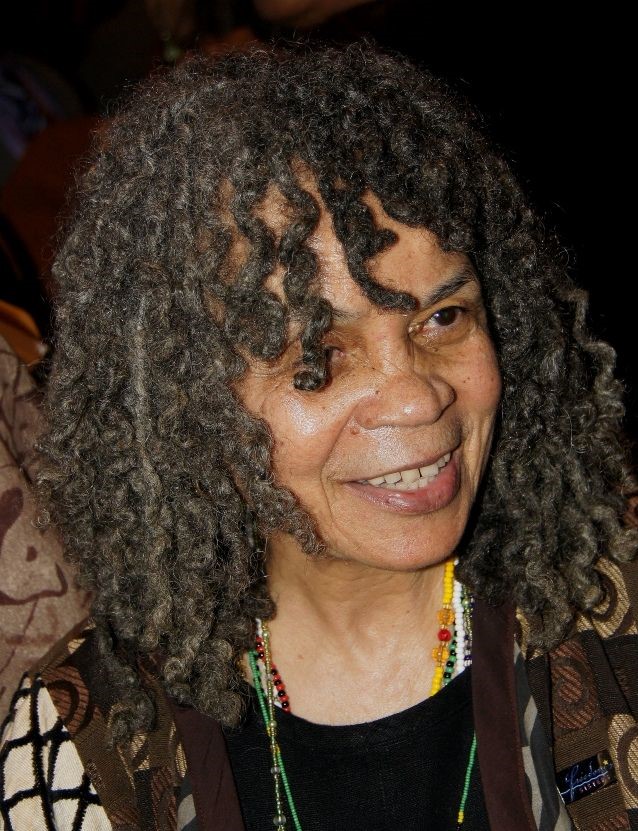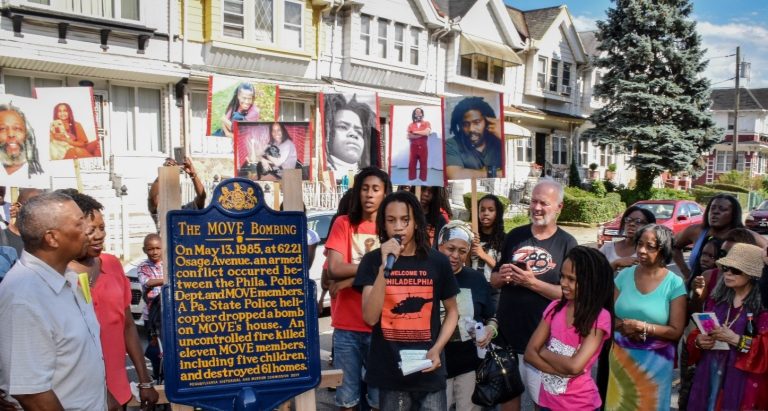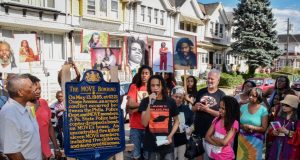Elegy (for MOVE and Philadelphia)
Essay
In “Elegy (for MOVE and Philadelphia),” Philadelphia poet and playwright Sonia Sanchez (b. 1934) questions the paradoxical nature of a city that seemingly set itself and its people ablaze. Written in response to the 1985 police bombing of the radical group MOVE and the subsequent fire that occurred on the 6200 block of Osage Avenue, Philadelphia, the poem aims to critique not only the police response to MOVE, but also the biased coverage of the organization by the media, which Sanchez perceives to be partially to blame for the bombing.

Sanchez, an African American poet, playwright, children’s author, activist, and professor, was born on September 9, 1934, in Birmingham, Alabama. After moving to Harlem, New York, during the 1950s Sanchez became involved with the Congress of Racial Equality (CORE), a civil rights organization. Through this group, Sanchez met Malcolm X (1925-65), who influenced her curt but passionate poetic style. Sanchez also met other prominent civil rights leaders, such as Martin Luther King Jr. (1929-68) while he was on a book tour in 1957. Sanchez’s involvement with influential civil rights leaders and activists led her to become a foundational member of the Black Arts Movement of the 1960s. A majority of Sanchez’s work, especially 1969’s Homecoming and 1970’s We a BaddDDD People, displays a deep connection with Black heritage and community. She moved to Philadelphia in 1976, just nine years before the events of May 13, 1985.
Sanchez’s activism continued to influence her work into the 1980s. Although Sanchez wrote “Elegy (for MOVE and Philadelphia)” (sometimes titled “Elegy: For MOVE and Philadelphia”) in response to the 1985 tragedy, the poem was not published until 1987 as a part of Sanchez’s seventh poetry collection, Under a Soprano Sky (1987). Sanchez waited to release the poem in an effort to not appear accusatory.
“Elegy (for MOVE and Philadelphia)” is a free-verse poem written in eight numbered sections, with eleven stanzas of varying lengths. Sanchez adopts the form of an elegy in order to mourn the eleven deaths and extensive destruction that resulted from the bombing of Osage Avenue. The poem begins with a description of Philadelphia as a city with “southern” racial attitudes hiding behind its northeastern locale, then quickly moves to the fire, death, and destruction that resulted from the bombing. “Elegy” focuses particularly on the tragic impact that the bombing had on Black Philadelphia because of perceptions of MOVE as part of the Black Power movement. Additionally, Osage Avenue (referred to as “osage st” in the poem) is located in West Philadelphia, a section of the city that became heavily populated by African Americans during the 1950s.
As the poem continues, it assigns the reader two roles: bystander and reporter. As a bystander, the reader is urged to bear witness to the horrors of the fire firsthand; then, sardonically, the poem asks the reader in the role of the reporter to cover the story in a passive, underhanded way. “Elegy” ends in a sermonlike call to acknowledge the “beyond”—a reminder that a city is more than its tourist destinations and traditions; a city is also its people. The poem acts as both a lament and a memorial, encouraging the reader to remember the tragic aspects of the bombing, despite the more appealing aspects of Philadelphia’s cultural heritage.
Critics praised Under a Soprano Sky and “Elegy (for MOVE and Philadelphia)” for Sanchez’s commitment to a variety of poetic styles, such as haiku, sonku, and tanka, as well as her incorporation of blues and jazz culture into her writing. Recognizing that the content of “Elegy” made people uncomfortable at first, Sanchez did not read the poem publicly until three years after the bombing. She then chose to read the poem at a gathering in Philadelphia. Sanchez performed the poem again in a 1990 episode of the PBS series A Moveable Feast: Profiles of Contemporary Authors (1990-91). In the recorded reading, Sanchez emphasized the sermonlike quality of “Elegy” and the historical significance of poetry that emerges from tragedies like the MOVE bombing. Events like the MOVE bombing are “part of our [Philadelphia’s] history and it must be recorded in some fashion,” she said. “Not just the report, but also the poetry that records something that is terrible. … So therefore, we as people who live in Philadelphia must never let this happen again, you see. So, it [the poem] becomes part of history. It becomes a historical document also too.”
Later, in 2011, Mayor Michael Nutter (b. 1957) appointed Sanchez as Philadelphia’s first poet laureate in recognition of her ability to define the City of Brotherly Love in both its beauty and disgrace. In “Elegy (for MOVE and Philadelphia),” Sanchez memorialized the cultural and historical significance of the MOVE bombing so that it would not be forgotten.
Laurene Munyan is a high school English teacher in southern New Jersey. She is currently an M.A. candidate studying English at Rutgers University-Camden. (Author information current at time of publication.)
Copyright 2019, Rutgers University


